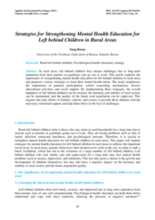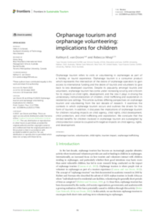Displaying 411 - 420 of 4424
Dr Rhiannon Evans, Reader in DECIPHer, discusses a systematic review taken of international evidence to understand what programmes work for improving the mental health of care-experienced children & young people, how they work, and what m
This article explores the importance of strengthening mental health education for left behind children in rural areas and proposes various strategies to meet their mental health needs. The study emphasizes the importance of parental participation, school counseling mechanisms, diverse educational activities, and social support.
The Care Transition Accelerator Academy provides world-class training from global experts to equip local leaders with the tools and resources necessary to support local programs through the process of transitioning from residential care to family care.
This article outlines differing perspectives on orphanage tourism and volunteering from the last decade of research. It examines the contexts in which orphanage tourism occurs and outlines the drivers for this form of tourism. In addition, it discusses the implications of orphanage tourism for children including impacts on child agency, child rights, child development, child protection, and child trafficking and exploitation.
Bethan Carter, a research associate at Cardiff University, discusses the ReThink Project; a project run in collaboration with Adoption UK and Coram Voice to investigate what processes are linked to mental health and wellbeing of care-experienced young people and how they manage at two key transitions in life.
This webinar explores the existing evidence of the connections between climate change and risks to children’s protection and discuss the role that child protection actors and the wider humanitarian community can take to ensure the protection of children and well-being of children impacted by the climate crisis.
-
Time: 1:00 p.m. to 2:30 p.m. EST
This global systematic review incorporated a comprehensive search of available literature from 1990 and captures the extant literature relating to process evaluations for interventions which address care-experienced children and young people’s mental health and well-being, and is one of the first syntheses of process evaluations in social care.
On November 8th at 2:00 pm CET, the Alliance will host a global launch of the revised CPHA Competency Framework and the available tools to support its use by individual practitioners, teams and organisations.



